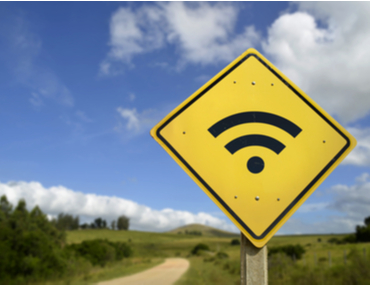 By Allie Faulkner, MSW Candidate and CHRT/WHI Intern
By Allie Faulkner, MSW Candidate and CHRT/WHI Intern
Amidst the COVID-19 pandemic, our need for reliable, high-speed internet has been intensified, becoming a lifeline for how we participate in work and school, seek medical attention, access information, and stay connected.
Even though the need is apparent, broadband is limited in many areas of Washtenaw County, particularly rural communities in the western half of the county. Recent data from the Washtenaw County Broadband Task Force tells us that approximately 8,000 rural Washtenaw households (or 20,000 residents) lack high-speed internet.
These areas are underserved generally because large telecom companies are leery of costly infrastructure that might not provide sufficient returns on investment in sparsely populated locations.
While high installation costs, plus complex regulations surrounding installation, have been ongoing barriers to many communities seeking broadband, there are short and long-term solutions in the works.
Wifi hotspots across the county
In order to meet more urgent needs for high-speed internet, various community stakeholders have offered wi-fi hotspots. For example, free wi-fi has been made available at a number of township halls and libraries including the Chelsea District Library, the Dexter District Library, and many others.
To find a free wifi hotspot near you, search this map of hot-spot locations developed and maintained by Connected Nation Michigan. Of course, hotspots like these aren’t as accessible as broadband in the home.
Lyndon Township, an area with a population of approximately 2,800 in the northwest corner of Washtenaw County, found a long-term solution for its residents. After six years of effort, Lyndon is about to launch community broadband access.
How Lyndon got broadband
Beginning in 2014, a group of Lyndon Township residents started a grassroots effort to explore options around establishing broadband in their community.
Gary Munce, a member of The Washtenaw County Broadband Task Force and a Lyndon resident, said they started by engaging local government leaders. “The first thing we needed to do was to demonstrate to the Township Board of Commissioners that there was a need for this,” he says.
A survey was sent to township residents and questions regarding internet access were added to the Township’s 2015 Planning Commission Survey, and the response was clear. Lyndon Township residents voiced a strong desire for reliable internet.
Next, the township allocated funding to perform a feasibility study to learn the costs and components of a township-wide broadband installation project. Then a $7 million tax millage proposal was designed for voters to consider and forums were held for residents to learn about and discuss the millage.
When it was time to go to the polls, Munce says, “[We] had about 43 percent of the township voters turn out, which is extraordinarily high.” The millage passed with a 2-to-1 margin. “[It was] one of the highest turnouts of any non-presidential or primary election,” says Munce.
After securing funds, the township bid out the construction of an underground fiber network and then partnered with Midwest Energy and Communications (MEC), a well established Michigan electric company. MEC would be responsible for providing internet service and operating the broadband network. The project is due to be completed this November and affordable broadband subscriptions are now available with nearly 700 households already online.
Lessons from Lyndon for other rural communities
Although Lyndon has succeeded–due to passionate volunteers, buy-in from the community and its leaders, and successful collaborations between all parties–other rural areas in the county are still discussing broadband expansion.
Because each location is configured differently, the steps Lyndon took may not be appropriate everywhere. “There is no one size fits all solution,” says Munce.
To assist in finding solutions for other areas of the county, The Washtenaw County Broadband Task Force has been collecting data and assembling resources for future broadband expansion.
Since it was assembled by the Board of Commissioners in 2017, the task force established a goal of closing the digital divide by 2022. Steps to achieving this have involved extensive data collection, developing best practices, and working with community stakeholders to navigate complex regulations.
As observed in the Lyndon Broadband project, achieving comprehensive coverage is possible, but it is often a lengthy process.
As COVID-19 persists in Washtenaw County, so does the need for reliable access to high-speed internet. Success stories like the one experienced in Lyndon Township–a testament to the power of grassroots efforts and community collaboration–show it can be done.
